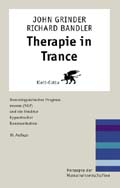Topic Overview
» Quote
» The Milton Model
» Exercise for this week
» Supplementary Links
» Metaphor of the Week
» Book Recommendation
» General Information
Resources
Valuable resources are available for you – including NLP Practice Groups, NLP Library and NLP Online Community
Archive
» Lessons 01 - 10
» Lessons 11 - 20
Lessons
Audio/Video Contributions
» Milton Model Introduction
» Trance Induction 5-4-3-2-1
Text Articles
» Biography of Milton Erickson
Success Checks
» Testing 01
» Testing 02
» Testing 03
» Testing 04
NLP Email Training 21
Quote
“Your unconscious is smarter than you are!”
– Dr. Milton Erickson
The Milton Model
The Milton Model is named after Milton Erickson, one of the probably most significant hypnotists of the last century. He preferred a language style in his therapeutic training that is often referred to as “artfully vague.” Such language patterns allow for statements that sound specific but leave room to find the missing information within oneself. This way, the listener can add concrete content from their own experiential world. The use of unspecific language forms aims to induce and maintain a trance state, thereby connecting the other person with the hidden, unconscious resources of their personality. There is a wealth of stored material in the unconscious. In the trance state, learned limitations are loosened by the usual reference frames, thus unconsciously releasing potentials for problem-solving. It is important to integrate what has been learned into everyday life to also consciously think about it.
Exercise for this week
For this exercise, you will need two more partners. Form a trio with them (A → B → C).
A thinks of something that fits the following description: a situation in which he/she is internally involved and where the attention is focused on a specific area, e.g., jogging, reading a book, writing, watching TV, going to the cinema, a long car ride …
A names a simple designation for the situation – no details. Just one word, then A leans back, closes their eyes, and pretends to be in hypnosis. The other two should then describe in statements about sensory perceptions what would necessarily belong to the situation if they were experiencing it. One thus puts oneself in the “I” position and no longer sees the situation from the third person. Example situation: jogging. Not “The sun is shining on your body,” but “You feel your feet moving.”
So you must remain indefinitely vague. B and C take turns every two sentences. Everyone should have a turn. Person A should be closely observed. A pays attention to which statements bring them deeper into the experience.
Supplementary Links
Audio:
The Milton Model – A Brief Introduction »»»
Stephan explains some patterns of the Milton Model in short examples.
Trance Induction 5-4-3-2-1 »»»
Here you will find a way to lead someone into trance.
Text:
Biography of Milton Erickson »»»
The probably most significant hypnotist of our century.
Metaphor of the Week
The Circus Bear
Once upon a time, there was a circus bear. His home consisted of a small cage. He had been born in such a cage and spent his free time taking ten steps forward and then ten steps backward in this cage. At some point, the circus director decided to give up the circus, as he was only making losses. He drove the bear into the forest, set the cage down, and opened the door before leaving. The bear poked his nose out of the open cage door. Now the world was open to him for a life as a free bear. The bear jumped out of the cage. He trudged one step forward, four, six, eight, nine … But after the tenth step, the bear went back ten steps …
Book Recommendation

Therapy in Trance
Authors: Richard Bandler & John Grinder
Short Description:
“Therapy in Trance” is a teaching seminar by John Grinder and Richard Bandler, for somewhat more advanced readers.
The book provides a comprehensive overview of hypnosis techniques and invites you to gradually develop your hypnotic skills through practical
exercises. Thoughtfully selected case studies complement this work with a wealth of therapeutic contexts in which the described methods can be promisingly applied.
Here the book can be ordered: Now on Amazon
General Information
NLP Practice Groups
If you are still looking for someone for an NLP practice group near you, then take a look here: www.nlp-peergruppen.de
Archive
We have created a Archive with the past lessons and links created. There you will also find this lesson again as a webpage in HTML. There are always some email programs that display strange characters and do not receive clean emails in either our text or HTML format. In this case, use the online archive to read the lessons. Also use the archive if you quickly need a link, have lost one of the previous lessons, or have not received a lesson.
Advanced NLP Seminars
Of course, we also offer real seminars with personal encounters. This starts with our free NLP Evening Seminars in various cities in Germany and goes up to complete, twenty-day trainings: Practitioner, Master, Trainer and Coach.
Unsubscribe
You are receiving this email because you or a friend of yours ordered it directly from me. If you no longer wish to receive the email training, please use the link provided at the very top above the logo to unsubscribe. There you can also change your email address.
Live your dream!
Stephan Landsiedel







